The fabulous Bristol Harbour Festival is on again! This means it is over a year since Professor Hilary Carey, Professor of Imperial and Religious History, and Dr Sumita Mukherjee, Associate Professor in Modern History, received funding from the Arts and Humanities Research Council for a project examining missions to British and Asian seafarers in the ports of Bristol, Liverpool, Hull and London.
What progress has been made?
The most important change is that we are now a team.
We are delighted to introduce Dr Lucy Wray who comes to us from Belfast where she has been working on the Madill Archive project, a collection of over 5,000 photographs documenting the history of Irish boats. Lucy is working on the stream of the project which focuses on lascars, a term often used for non-European seafarers employed on British ships. Lascars were predominately from Asia, Africa, and the Caribbean.
We also welcome Dr Manikarnika Dutta, who is an historian of colonialism, medicine and public health. Her DPhil thesis at Oxford studied the health and welfare of European seamen in Indian port cities such as Calcutta and Bombay. In this project, she will be working on British mariners and the imprint the network of sailors‘ homes, missions, orphanages and welfare services had on port cities.
Our research administrator is Jess Kirkby, who has lived in Bristol for the last ten years and has worked for a number of charities in the culture and environment sectors, including the RWA Gallery and the Forest of Avon Trust.
In the sections below we outline some of our work in the past few months.
Port histories
We are only getting started, but already we are finding that archival records relating to the merchant marine are voluminous and very widely scattered. Partly because they were situated in liminal settings, literally by the shore and within easy access to commercial ports, many of the buildings that used to cater for the peripatetic merchant marine are no more.
We are currently building a project website where we hope to map out some of the historical traces that missions and seafarers left on port cities, including Bristol.
During the Bristol blitz of 1940, the Seamen’s Mission Church on Prince’s Street was partly destroyed and remains an eyesore in the heart of the city.
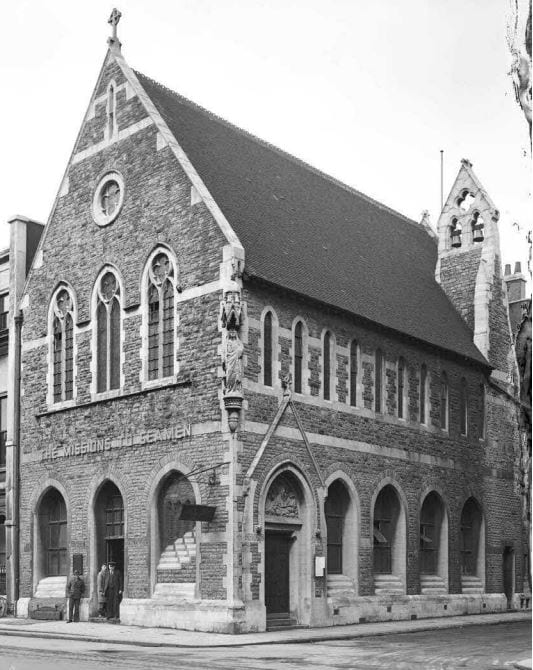
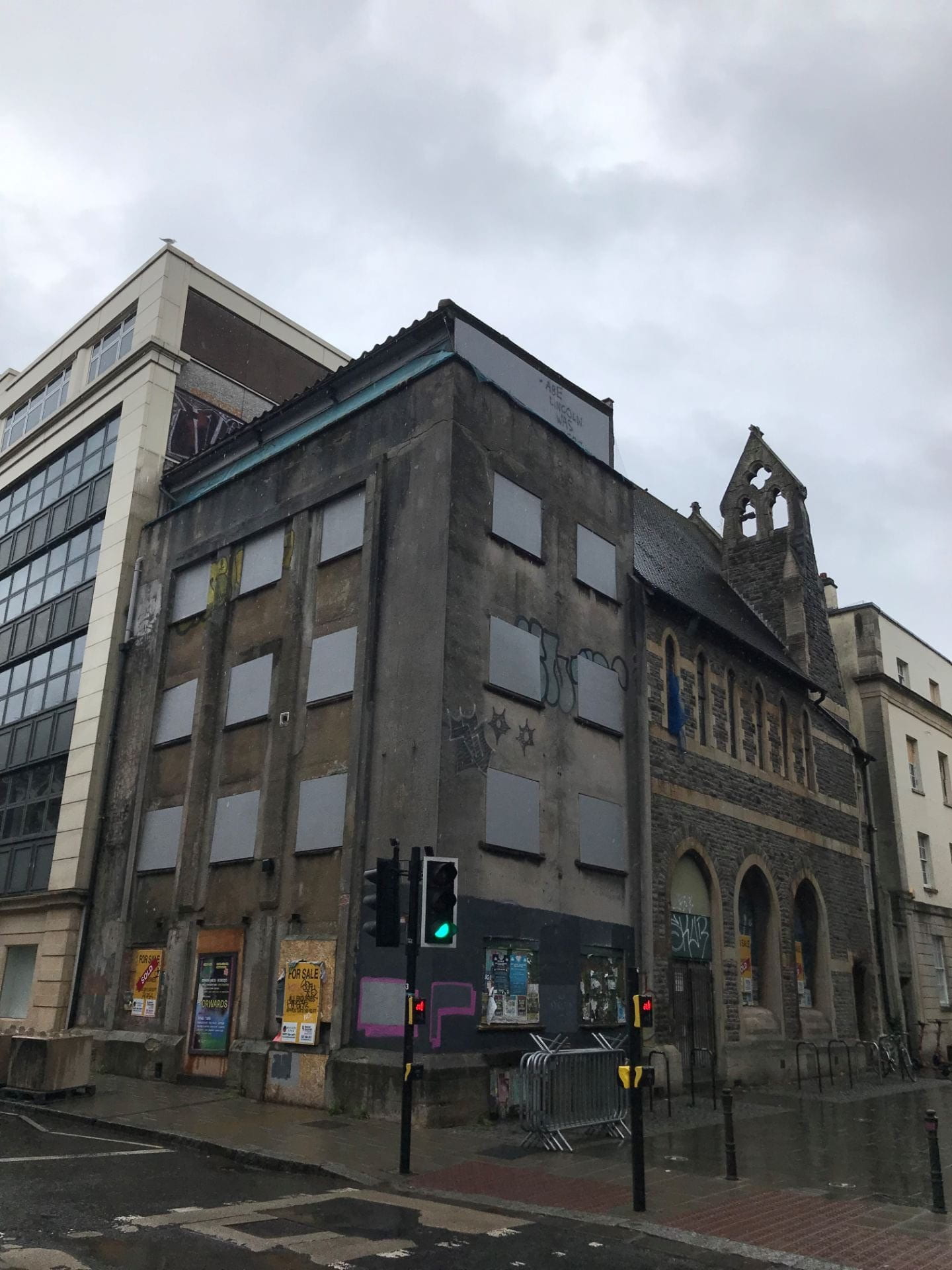
In May 2023, BristolLive reported that there were plans to restore the building, with one proposal advocating the creation of a Museum and Memorial to the Victims of Enslavement. If so, it will have fared better than the magnificent Liverpool Seaman’s Mission, of which all that remains are the gates – now part of the portside shopping centre.
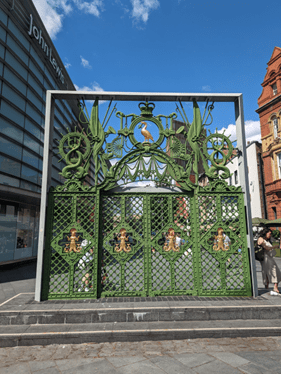
Race and empire histories
Lucy Wray has been scouring the print records of missionary societies looking for visual sources for the project. The illustration below encapsulates the project’s key themes around race, religion and empire. The scene from 31 May 1856 shows Prince Albert surrounded by guests of different ethnicities in a room strewn with flags from the empire and a biblical banner reading ‘Be not forgetful to entertain strangers’. The monarch was welcomed by waving crowds at London’s West India dock as he laid the foundation stone for The Strangers’ Home for Asiatics, Africans and South Sea Islanders.
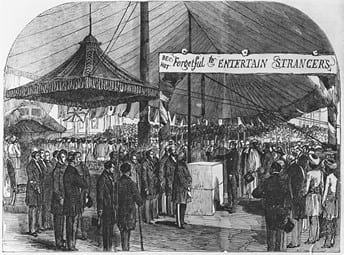
Prince Albert lays the foundation stone of the Strangers’ Home, 31 May 1856, Illustrated London News, 14 June 1856. Source: Public Domain. Wikimedia Commons
Lucy is exploring how religious institutions like the Strangers Home for Asiatics interacted with lascars. In the nineteenth century, the British Merchant Marine was transformed by the employment of lascars. On the outbreak of war in 1914, 30% of merchant crews were born abroad, and lascars comprised 1 in 6 of these men.
In addition to difficult working conditions, restrictions, lower pay, and prejudice, lascars struggled to find accommodation in British ports. For most of the nineteenth century, voluntary religious societies and missions were the mainstays of welfare, accommodation and support services for this extensive, vulnerable, multi-ethnic and multi-religious labour force. By exploring visual sources, alongside print sources, Lucy hopes to offer insights into the gendered and racialised ways in which missions and lascars interacted across the century.
British mariners, missions and welfare
Manikarnika Dutta has been working in the Hull History Centre which holds the records of the Anglican Mission to Seafarers, who are our project partners.
She has found extensive annual reports of the Port of Hull Society for the Religious Instruction of Seamen and the Hull Sailor’s Home. These reports describe the religious and moral advice to British seamen through ministries and the promotion of healthy living practices through institutional accommodation between voyages.
Manikarnika has been particularly struck by the institutions created for the families of seafarers, and the extent to which the women of maritime ports supported charitable and religious outreach to sailors. One example was the Hull Seamen’s and General Orphan Asylum, ‘established for the maintenance, clothing and education of the Fatherless children of seamen and others’.
A very interesting part of the archives are the Hull Mariners’ Church Orphan Society records that describe the welfare for the children of seamen, especially local fishermen, who died in shipwrecks or from other causes in service. Manikarnika will be studying this further to understand the history of orphanages as charitable institutional care and compare different trajectories of Victorian debates on child welfare. She hopes to address broader themes such as poverty, homelessness, criminality along with compassion, love and charity and Christian morals to write an emotional, social and religious history of care homes for seamen.
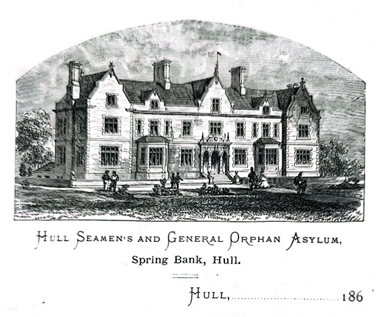
Hull Seamen’s and General Orphan Asylum, 1860. Hull History Centre, The Records of the Hull Seamans and General Orphanage, ALBUM 1863-1900, C DSHO 2/56. Credit: Hull City Archives, Hull History Centre
In May 1871, the children of the Orphan Asylum sang a special hymn with these words:
Thou Who are the Orphans’ Father
Deign to hear the Orphans’ prayer
While they round Thy footstool gather,
Humbly trusting in Thy care.
Here no father’s arm defends them,
Here no father’s love can bless,
Strangers’ aid alone befriends them,
Father! Help the fatherless!
Source: Hull History Centre, The Records of the Hull Seamans and General Orphanage, ALBUM 1863-1900, C DSHO 2/56. Credit: Hull City Archives, Hull History Centre.
What comes next?
We are eagerly looking forward to further discoveries in Liverpool, Hull and Bristol. We are excited to find how different these cities were – and how diverse and adventurous the lives of the sailors who visited them were.
We are especially keen to find out how British and Asian mariners worked together and why the merchant marine became so racially, religiously and socially divided. If any readers have any of their own stories or images to share about this fascinating history, please get in touch with the project team!
Contact us
You can follow the development of the Mariners project through our Bristol blog. Or do send us an email:
Hilary Carey hilary.carey@bristol.ac.uk
Sumita Mukherjee sumita.mukherjee@bristol.ac.uk
Lucy Wray lucy.wray@bristol.ac.uk
Manikarnika Dutta manikarnika.dutta@bristol.ac.uk
Jess Kirkby jess.kirkby@bristol.ac.uk




 We trialled the first draft of Rex’s script at the University of Bristol’s
We trialled the first draft of Rex’s script at the University of Bristol’s 



